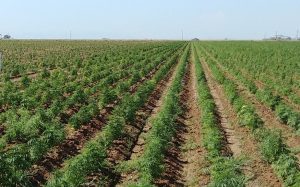
(This story has been updated with more details and reaction from hemp farmers.)
Federal crop insurance is finally coming to some hemp farmers as the U.S. Department of Agriculture (USDA) takes more steps toward adopting new rules for hemp production.
Industrial hemp farmers producing hemp for fiber, flower or seeds will be eligible for crop insurance coverage under the Whole-Farm Revenue Protection (WFRP) program for the 2020 crop year, the agriculture department announced.
The USDA’s Risk Management Agency (RMA) said the insurance will be available for farmers who are part of state or university research pilot programs, as authorized by the 2014 Farm Bill.
The move comes nearly nine months after hemp became a legal crop in the United States. For now, farmers are raising hemp at their own risk or with costly private crop insurance.
The WFRP provides coverage for agricultural commodities up to a total insured revenue of $8.5 million and is common for specialty crops, organic commodities and nontraditional crops.
To be eligible for the WFRP program, farmers must be compliant with state plans, and their hemp crops must not test over the 0.3% THC limit. Hemp will not qualify for replant payments under the policy.
Once USDA releases the much-anticipated hemp production rules, the Farm Service Agency (FSA), the Natural Resources Conservation Service and other USDA agencies will share eligibility information on their programs, including loans and disaster-assistance programs.
This will include additional insurance coverage through FSA’s Noninsured Disaster Assistance Program and RMA-administered crop insurance.
“We expect to be able to offer additional hemp coverage options as USDA continues implementing the 2018 Farm Bill,” Barbre said.
Legitimizing hemp
Hemp farmers told Hemp Industry Daily that the crop-insurance announcement legitimizes hemp as a row crop, like other agricultural commodities, and provides security for new and longtime farmers.
“It’s a monumental step forward for the industry and a huge relief to so many farmers around the country,” said Steven Turetsky, managing director of Shi Farms in Pueblo, Colorado.
“It puts hemp in a world with traditional ag now,” he said. “It’s going to provide a level of security for farmers around the country who have already converted their crops from traditional crops to hemp or are heavily considering it, with lots of big states still coming online next year that haven’t even grown hemp, like Texas.
“It’s going to be great.”
Malcolm Anderson, chief operating officer at Green Heffa Farms in Liberty, North Carolina, said crop insurance is a vital part of American farming. He lost his 2018 crop to Hurricane Florence, a total loss.
“We did get some disaster assistance from the state, which was good, but having crop insurance going into next year’s season will help, especially with investments,” Anderson said.
Bigger than insurance
The move to federally recognize hemp by making crop insurance available like any other agricultural crop – and reiterating it’s not marijuana – should help open other discussions with government agencies regulating hemp, Turetsky said.
He pointed to water rights as an example.
“We’re still waiting for hemp to be considered an agricultural crop by the water district in Colorado,” he said. “So something like this is going to be another iron in the fire to help push those conversations along.
“Even in states like Colorado, there are regulatory bodies that still consider us marijuana, which is completely ridiculous.
“So having federal crop insurance is going to be another thing I can take to the water board, and say, ‘Hey, guys, this is not marijuana.'”
Anderson agreed, saying his hemp farm also had trouble getting water when it was setting up for hemp production.
“Planting a row crop, I couldn’t get certain things like a well because there are certain rules – you had to have farm animals (to get a well),” Anderson said. “So this will open up a lot of things for farmers also to get infrastructure that they need for their farms.”
“The USDA being able to give us insurance legitimizes the crop, so we can put a value on what we put in the field now – we’re looking for the return, instead of just what the state gave us for the seeds that we put in the ground.”
Laura Drotleff can be reached at [email protected]

